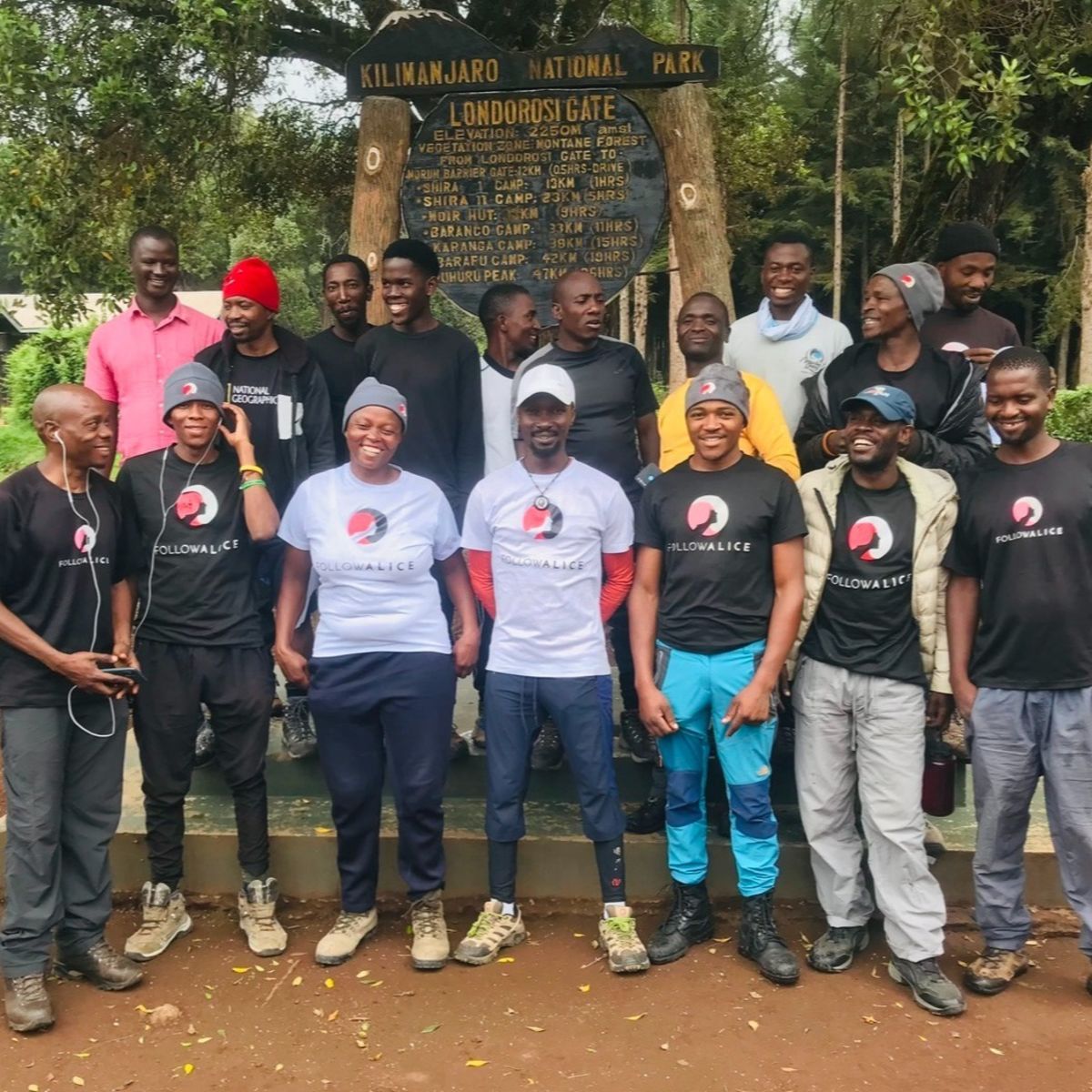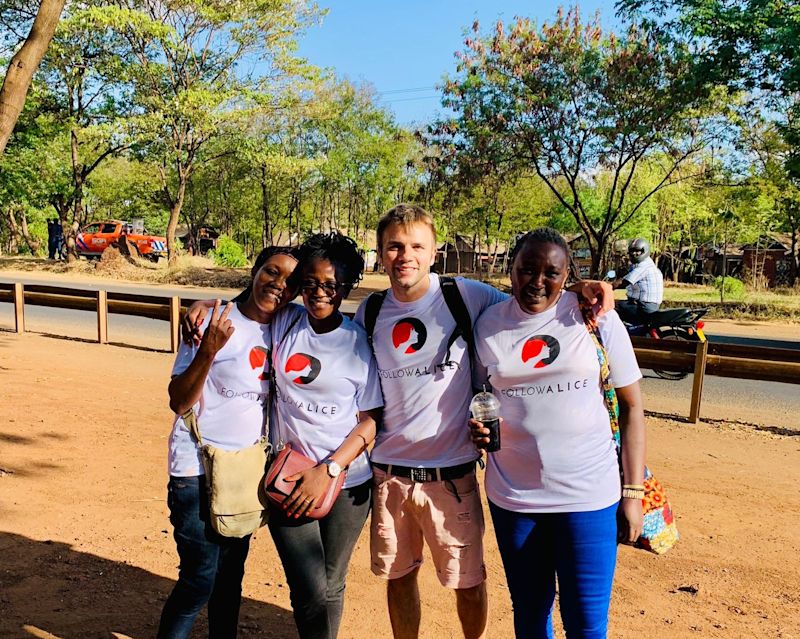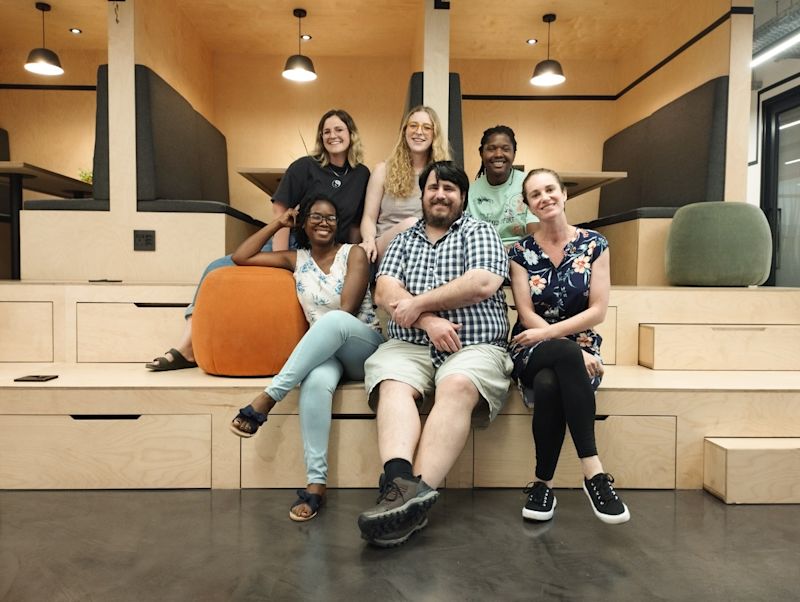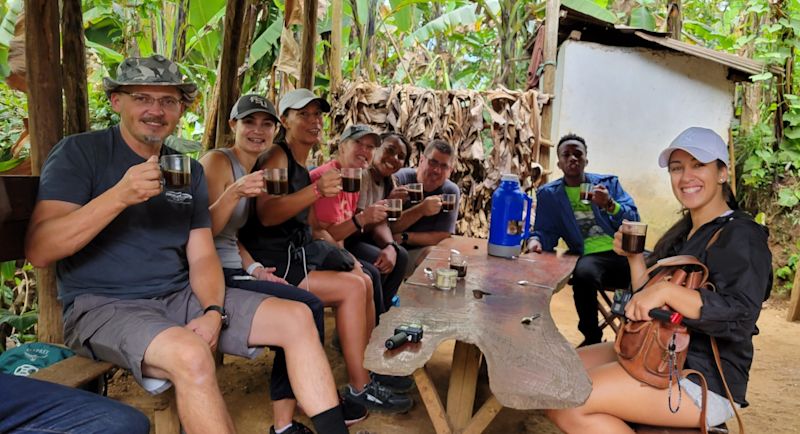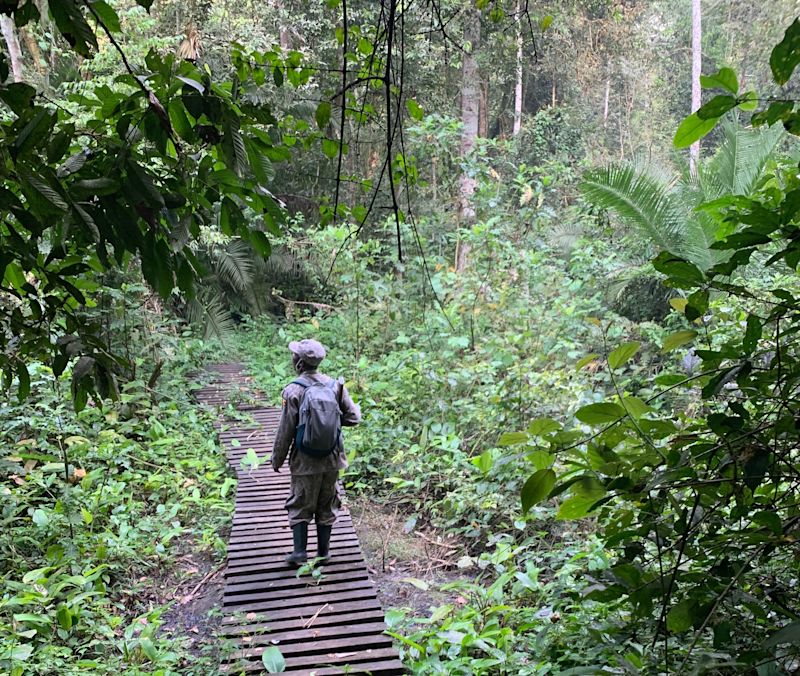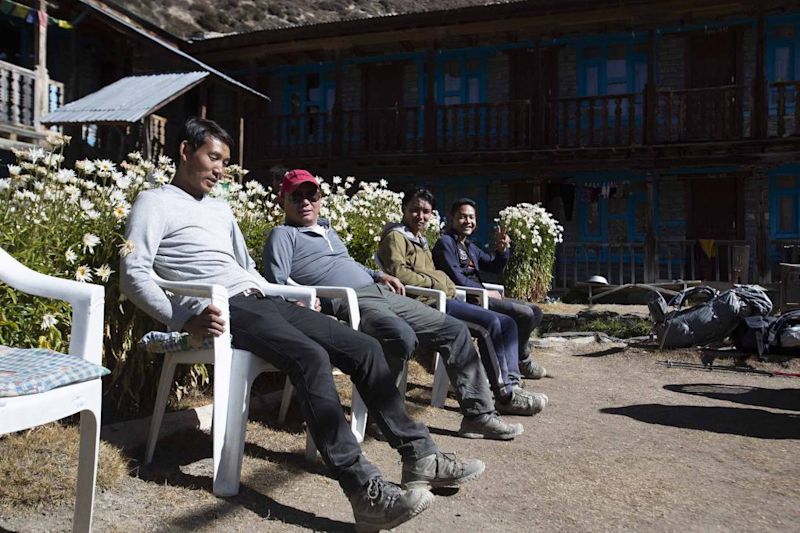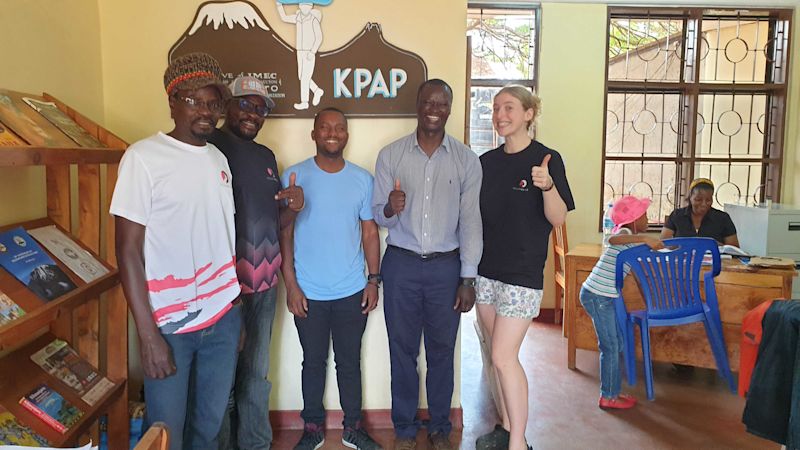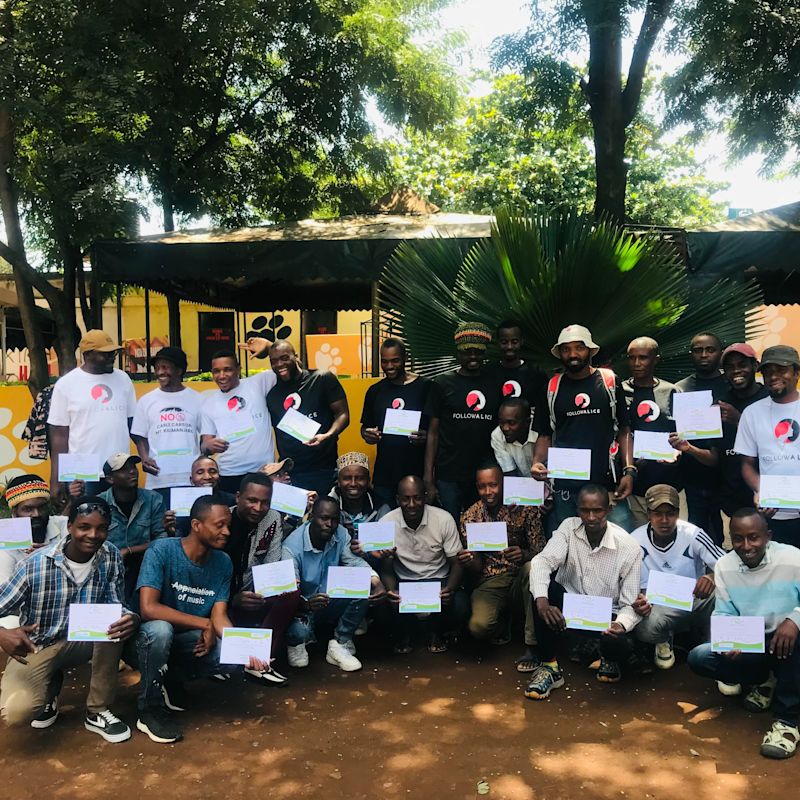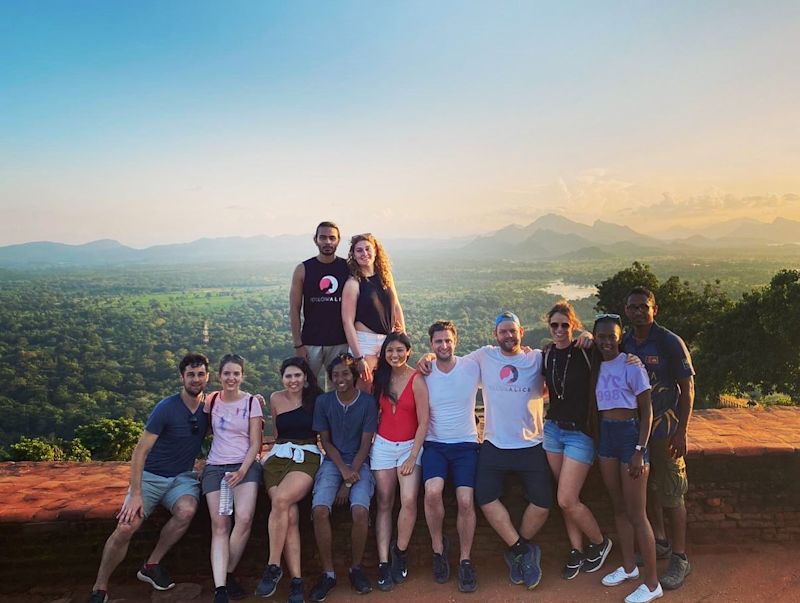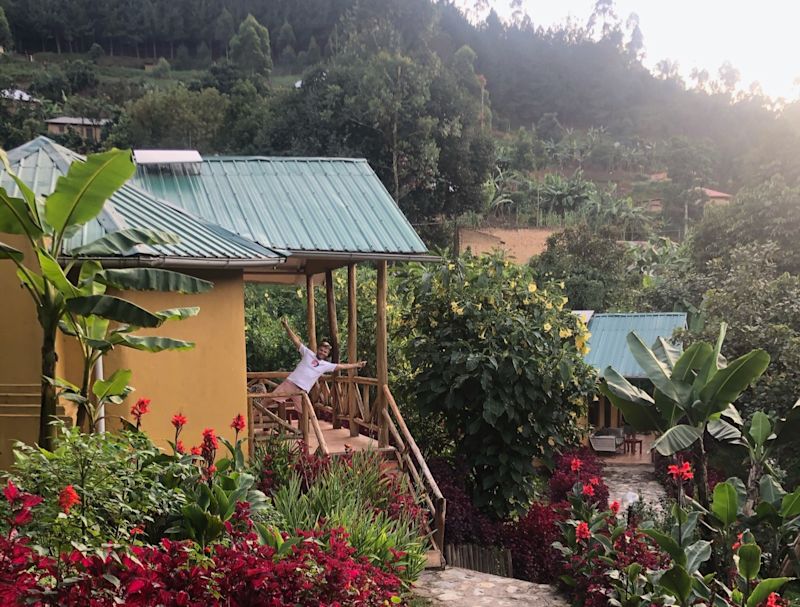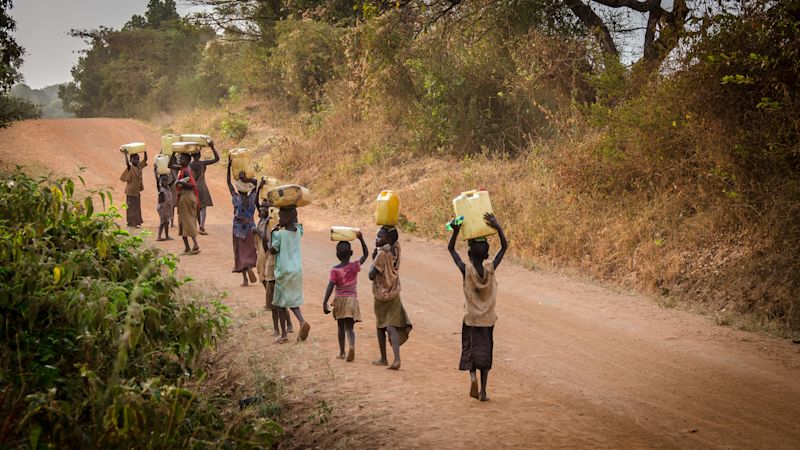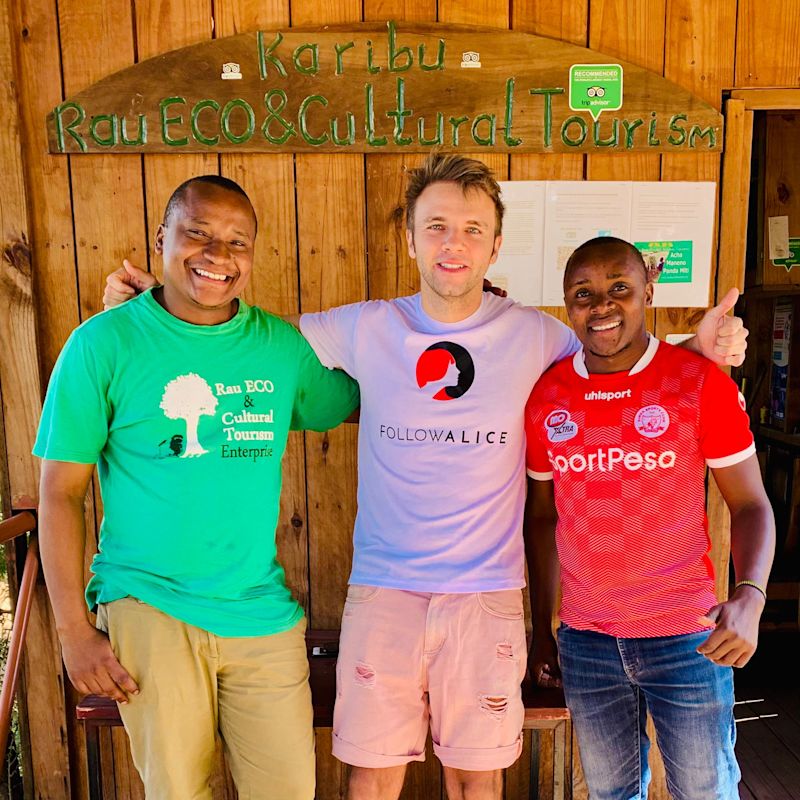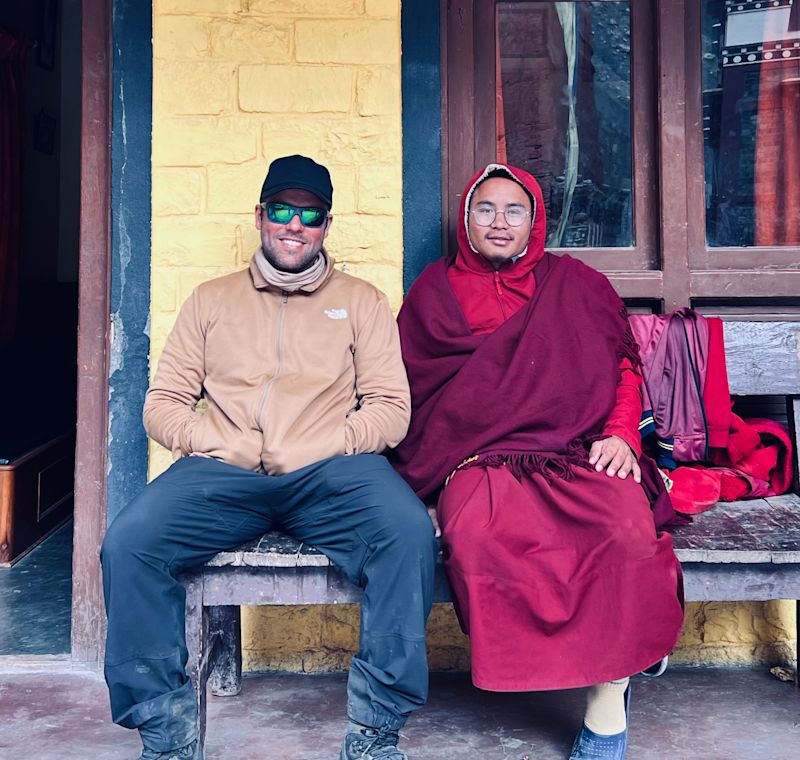Sustainable tourism is an important topic at Follow Alice. We also think a lot about corporate social responsibility (CSR).
These topics aren't always easy, as there are no clear-cut 'answers'. The issues tend to be complex and there are diverse and compelling arguments for approaching them in a variety of ways.
As such, the twin topics of sustainable tourism and corporate responsibility have led to many hours of research, discussion, soul-searching, and back and forth among our team.
One of our founders, Dez, with some of our fabulous Tanzania team!
As some of you already know, we're a company made of up travellers. This means we have a vested interest both as a company and as individuals to ensure that the great places we take you to visit stay great.
Our evolving approach to sustainable tourism
So one of the first things we should say here is that how we approach sustainability and corporate responsibility at Follow Alice isn't a fixed matter. We're learning and evolving in this regard as we learn.
We're open to doing things differently in the future if (or, more likely, when) we see a better or more feasible way.
We know that we need to keep educating ourselves in this space. And so while we're working towards better engagement with the pressing concerns of sustainability, especially as they relate to the travel industry, we won't ever be able to 'tick a box' and then sit back on our laurels. The work that's needed is evolving and ongoing.
Our sales and marketing teams are mostly based in Cape Town
What is sustainable tourism?
But to summarise, we think the term sustainable tourism encompasses the many concerns relating to:
- economic development
- community wellbeing
- climate change
- animal welfare
- environmental health
Sustainable tourism strives to benefit – or at times at least not harm – local communities, economies, animals, plants, and habitats.
What does sustainable tourism look like?
Sustainable tourism can mean different things in different places.
Tourism that benefits people
Here's what tourism that benefits local businesses and communities might look like:
- All or most of tourists' money stays in the local economy.
- More jobs are created for locals (versus imported personnel).
- Locals are upskilled and included in management positions.
- Tourists choose small, independent accommodations and other tourist-facing businesses that are owned by locals.
- Everyone respects local communities (versus exploiting or mocking them).
Obviously there's more to it than what we've listed here, but these are some ways in which tourism can become more sustainable.
Sustainable tourism is primarily an industry issue, not a traveller issue. The industry needs to change to offer travellers better, more sustainable options.
Our clients on a coffee-tasting adventure near Kilimanjaro in Tanzania
Tourism that protects natural environments
And here are a handful of examples of sustainable tourism that benefits (or at least doesn't harm) wildlife and the natural habitat:
- Limiting the number of daily tourists that can visit popular attractions (like historical ruins, coral reefs and endangered animal populations).
- Drivers, bikers and hikers sticking to the track (to avoid disrupting animals, trampling vegetation and prompting soil erosion).
- Travelling by train instead of by air whenever possible.
- Visitors not littering or leaving behind used toilet paper.
- Visitors obeying park rules (like not engraving trees and only making fires in designated spots).
- Everyone respecting local animal populations (not trying to get too close to wildlife or startling them for reactions, for instance).
- Park entrance fees being used for conservation efforts (like anti-poaching efforts, tree planting and habitat regeneration).
- Accommodations making an effort to have eco-friendly practices (for instance, buying produce locally and using solar power).
- Fees for responsible animal interactions (like gorilla trekking or a visit to an animal orphanage) being used to support animal conservation efforts.
There are, of course, many other ways to engage in sustainable tourism.
Our client Amber took this snap of her guide on a gorilla trek in Uganda
Many of the changes needed to make tourism more sustainable need to come from those working within the tourism industry itself. But some changes are also needed by travellers. If you'd like to know what you as a traveller can do, please read How to travel sustainably and responsibly in 2023.
Note that if evermore travellers request and insist on sustainable travel options, the more the tourism sector is going to be pressured into making good changes. So you as a traveller do have some agency in this regard too!
Our current sustainable tourism efforts at Follow Alice
With all that said, we now share with you what we currently do think in this regard so that you can get a better picture of who we are, and why we do what we do (and why we don't do certain other things).
1. We work with local leaders and crews
One of the primary ways we engage in sustainable tourism is by working with local entrepreneurs in all of our host countries. This is instead of hiring or importing foreigners to be guides and crew members.
We refer to our lead partners in each country as "local leaders". These men (and hopefully someday soon we can say "women" too!) are locals who are responsible for sourcing and hiring their own staff (often mountain crews).
It's with the backing of Follow Alice that some of our local leaders have been able to emerge as businesspeople who are widely respected employers within their communities.
Our Nepal local leader Sonam with a few of his crew members
By partnering with local leaders, Follow Alice has become a company employing people of many different nationalities, languages and backgrounds. We love how diverse we are, and how we're dotted all over the globe! 🌍
2. We're a member of KPAP
The most popular of our trips at Follow Alice is our Kilimanjaro climbs.
It's therefore really important to us to focus on being a good and ethical Kilimanjaro tour operator.
In keeping with this goal, we're a registered partner of the Kilimanjaro's Porters Assistance Project (KPAP).
Some of our team meeting with the KPAP team in Tanzania in 2023
Being a member of KPAP means we:
- Treat our porters well, which includes ensuring they're properly clothed and fed, aren't overloaded, and are looked after medically when needed.
- Pay our porters according to industry guidelines.
- Train our porters and offer advancement opportunities.
- Educate our clients on proper Kilimanjaro tipping practice.
We also encourage clients to donate used or unwanted trekking gear to KPAP so that they can go to the porters most in need.
We think that one of the very best ways for Follow Alice to engage in corporate responsibility is for us to do what we're already doing, but do it in the most ethical and sustainable ways possible.
3. We follow the Leave No Trace principles
Another key way in which we're trying to engage in sustainable tourism is by educating ourselves and our clients on the seven principles of Leave No Trace, an NGO working to reduce the impact of humans on the outdoors.
The seven principles promoted by Leave No Trace (LNT) are:
- Plan ahead and prepare.
- Travel and camp on durable services.
- Dispose of waste properly.
- Leave what you find.
- Minimise campfire impacts.
- Respect wildlife.
- Be considerate of others.
We're a paid partner of LNT, and have worked with them to host a training workshop for our Kilimanjaro mountain crew.
Our Kilimanjaro crew with their certificates for doing the Leave No Trace training workshop
We're also planning to host a similar workshop for our Nepal mountain crews in the near future.
In late 2022, during the off-peak season, we also paid for some of our porters to take part in a multiday joint-effort clean-up operation on the mountain.
4. Lots of money stays in host countries
At Follow Alice, most of your trip package fee stays in the country and thus benefits the local economy and community.
This is important, as many of the most popular tourist destinations around the world have local populations that remain impoverished because tourists' money goes to companies and suppliers based outside of the country.
This is called economic leakage and it's one of the biggest travesties in the tourism industry.
The people and environment that experience the influx and strain of tourists should benefit monetarily from the experience.
At Follow Alice, the exact percentage of your money that stays in the local economy varies by destination. But we can tell you that roughly 70% of your package fee stays in the local economy.
One of our group trips to sunny Sri Lanka
5. We look for eco-friendly accommodations
Where possible, we opt to use accommodations that engage in eco-friendly practices.
Many accommodations in and around Bwindi Forest in Uganda are environmentally friendly
What does this mean? Well, it varies by region. In East Africa, for instance, where we visit habitats and landmarks of great natural beauty and diversity, we like to use accommodations with varying degrees of eco-friendly infrastructure, from solar-generated electricity to composting toilets.
Please note that many travellers have the misconception that eco-friendly establishments are by definition not luxurious. Not so!
Lake Natron Camp, for instance, which you can visit on our Tanzanian Safari and hiking itinerary, is a gorgeous and luxury campsite that's completely off the grid!
It's worth pointing out that the accommodations available on many adventure travels are naturally more eco-friendly than traditional accommodations. Think of glamping versus a traditional hotel, for instance.
What we avoid at Follow Alice
We've thought about this a great deal, and we don't feel it's the responsibility of us as an adventure travel company, or you as a traveller, to try and tackle all of the social ills in the countries where we host trips.
As mentioned earlier, we feel that our role is to be
- An ethical employer who looks after its employees and offers opportunities for local entrepreneurs.
- A tour operator that offers the most sustainable adventure trips possible.
These are the two ways in which we believe we can promote positive change and be a part of something meaningful and industry-changing. If we were try to dabble in initiatives outside of this, we'd be operating (probably bumbling around) in areas we know little about and are ill-equipped to handle.
Partnering with you on your projects
With this said, we're more than happy to help you, as our client, engage in any projects that are close to your heart.
We have, for instance, posted on our blog about clients who have undertaken Kilimanjaro climbs for charity. We've also been available to facilitate when clients have wanted to visit an NGO they know about on their trip.
For instance, we took a client visiting Uganda with us to meet with an NGO that engages water filtration systems in rural communities. He arranged with the NGO to install a water filtration system, and we were able to arrange his itinerary to include this and take him there and back.
Access to fresh water is a challenge for many in East Africa
So if you have a cause or some other project you'd like to engage in during your trip with us, please do let us know and we'll gladly assist you in this regard!
Pointing you in a good direction
Finally, if you'd like a list of NGOs and charitable organisations working in your chosen destination, we're happy to supply you with some suggestions that our local leaders have vetted to ensure they're legit. Just speak to your trip manager to obtain this list. 🤓
Note too that we also include opportunities to support local small businesses and grassroots initiatives in some of our itineraries. Some are staples in our itineraries, while others are included as optionals.
For instance, we can organise a homestay for you, a community experience, a visit to an animal orphanage, or the chance to plant a tree.
Dez meeting with the guys at Rau Eco and Cultural Tourism Enterprise
So please be on the lookout for these suggestions when reading through our trip offerings and then just let us know if you'd like to include one or more that are optional in your itinerary!
Adventure travel is a more sustainable form of travel
Finally, we thought this might be a good moment to just mention that adventure travel is more sustainable than regular travel. Did you know this? So if you're thinking of doing an adventure holiday over a cruise or a fancy city break, for instance, you're actually already engaging in a degree of sustainable travel.
The reason for saying adventure tourism is more sustainable than regular travel is that adventure travellers' money often benefits remote, underserved and even marginalised communities. Also, adventure travel often puts a spotlight on conserving areas or sites of great natural beauty or significance.
Long live adventure travel!
When a tour operator offers adventure trips, they're offering people more sustainable travel options.
Our client Hala was a natural in sparking up conversations with locals on his 2022 Annapurna Circuit trek
Talk with us
Perhaps the best way to end this post for now is to extend an invitation to you to chat with us. We're open to feedback and ideas from you, our clients and partners in travel.
There's no fake humility here – we really and truly know that we still have so much to learn, individually and as a company, and that there's more for us to do in this space.
So please do reach out to us if you have any thoughts and ideas to share. We appreciate you engaging in this important topic with us. 😊
